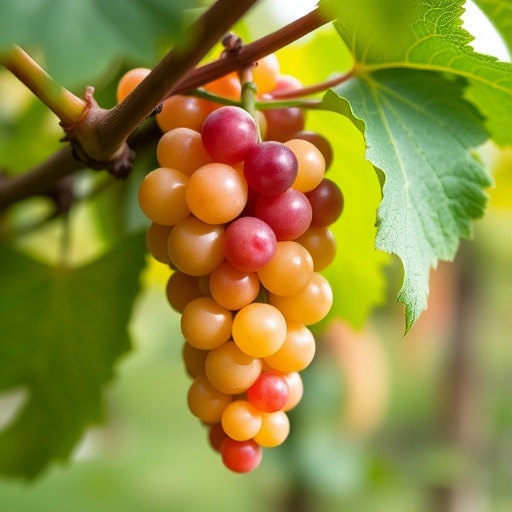Recent advancements in the field of phytochemistry have shed light on the complex interactions between natural compounds and their biological effects. In this context, the study conducted by Sun, Chen, Zhang, and colleagues delves into the wine-processed mechanism of corni fructus, a traditional medicinal fruit, utilizing a novel comprehensive strategy. This innovative approach not only analyzes the variations in the chemical components but also employs advanced network analysis techniques to understand the underlying processes better.
Corni fructus, derived from the fruit of the Cornus officinalis tree, has been utilized for its health benefits in East Asian medicine for centuries. Traditionally used for its potential to nurture the liver and kidneys, the fruit’s compound profile suggests that its healthpromoting effects could be significantly influenced by its processing method. The team’s exploration into the wine-processing technique unveils a new dimension to understanding how different methods can alter the chemical composition and therapeutic potentials of corni fructus.
The research conducted by the team offers a meticulous breakdown of the chemical constituents that differ based on the processing method of corni fructus. Chemical profiling plays a crucial role in determining the pharmacological efficacy of natural products. By comparing the raw fruit to its wine-processed counterpart, the researchers were able to highlight specific compounds that exhibited enhanced bioactivity after fermentation. This revelation holds promise for the development of more effective natural remedies.
Furthermore, the scientists employed a network analysis framework, which is a cutting-edge tool that allows for a comprehensive examination of complex biological interactions. By integrating various data sets, including chemical composition and biological activities, the network analysis facilitated the identification of potential synergy among the active compounds. Understanding these synergistic relationships is pivotal for predicting the overall efficacy of the wine-processed corni fructus in both medicinal and supplementary applications.
One of the significant findings from the study is the identification of specific phenolic compounds that are enhanced by the wine fermentation process. Phenolics are known for their antioxidant properties, which play a vital role in combating oxidative stress, a contributing factor in numerous chronic diseases. With the wine-processing technique, certain phenolic content positively transitions into forms that exhibit improved bioavailability, raising an exciting avenue for future therapeutic applications.
The implications of this research extend beyond mere academic interest; they offer a plausible pathway to harnessing traditional practices in a modern context. By scientifically validating the practices surrounding the preparation of corni fructus, this study bridges the gap between traditional medicine and contemporary pharmacotherapy. Such integration is essential for advancing herbal medicine into the future, where evidence-based approaches can validate and optimize age-old practices.
Moreover, the study’s innovative methodology signifies an essential leap towards standardizing the quality and efficacy of herbal medicines. The application of comprehensive strategies, such as those utilized in this research, could become a cornerstone in the future exploration of other herbal materials. By employing similar frameworks, researchers can uncover the intricate biochemical changes that occur during processing, leading to a broader understanding of herbal pharmacology.
In the broader context of complementary medicine, findings from this study could revitalizing interest in the use of wine-processed herbs not just in Asia but globally. As the demand for natural products continues to rise, introducing scientifically valid processed forms of traditional botanicals could significantly enhance their appeal. The culmination of traditional wisdom and modern technology showcases an inspiring example of how age-old remedies can be reimagined for contemporary health challenges.
To extend the application of this research, further studies could investigate the pharmacokinetics of the wine-processed corni fructus in clinical settings. Understanding how these compounds behave within the human body, their metabolism, and their therapeutic windows will be crucial for substantiating the claims of improved efficacy. Such explorations could position wine-processed corni fructus at the forefront of natural health products, appealing to health-conscious consumers seeking alternatives to synthetic medications.
As a part of their ongoing research, the authors emphasize the importance of collaborative interdisciplinary studies. Engaging chemists, biologists, pharmacologists, and healthcare professionals will create a dynamic spectrum of perspectives, all aimed at optimizing traditional herbal preparations. This holistic approach can lead to groundbreaking discoveries and innovative product development that aligns with the increasing consumer trend towards natural and holistic therapies.
In closing, the findings from Sun and colleagues not only enhance our understanding of the biochemical landscape of corni fructus but also set a precedent for future explorations into other herbal remedies. The combination of traditional processing techniques with modern scientific scrutiny paves the way for impactful advancements in integrative health sciences, making a significant contribution to the field of complementary and alternative medicine.
Through the lens of this study, the medicinal potential of corni fructus has transitioned from age-old folklore to an exciting realm of scientific inquiry. The findings herald a promising future for wine-processed botanicals, emphasizing their role not only in historical contexts but as a viable factor in modern health practices. As researchers continue to unveil the complexities of herbal medicines, the scientific validation of traditional methods will undoubtedly guide the future of therapeutic interventions, ensuring that the power of nature is harnessed effectively and safely.
Subject of Research: Wine-processed mechanism of corni fructus.
Article Title: A novel comprehensive strategy for research on wine-processed mechanism of corni fructus guided by variation in the chemical components and network analysis.
Article References:
Sun, S., Chen, Y., Zhang, Y. et al. A novel comprehensive strategy for research on wine-processed mechanism of corni fructus guided by variation in the chemical components and network analysis. BMC Complement Med Ther 25, 312 (2025). https://doi.org/10.1186/s12906-025-05046-y
Image Credits: AI Generated
DOI:
Keywords: Natural Products, Phytochemistry, Herbal Medicine, Corni Fructus, Wine Processing, Bioavailability, Antioxidants, Network Analysis, Traditional Medicine, Complementary Medicine, Pharmacology, Interdisciplinary Research, Herbal Remedies, Clinical Applications.




